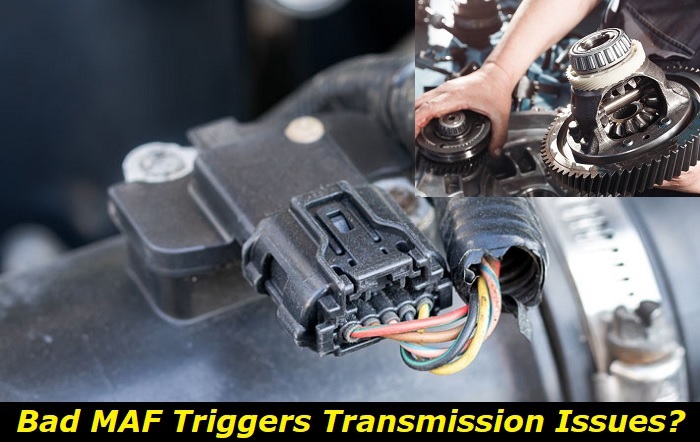The transmission is one of the most important parts of a vehicle. Without a properly functioning transmission, the power coming from the engine cannot be controlled, and thus, the car will have problems moving forward or backward. Similarly, the proper operation of the mass air flow sensor (MAF) is just as vital because it influences the workings of the engine.
Electrical gremlins highlights
- Level of urgency:medium
- DIY inspection:impossible
- DIY repair:impossible
- Can you drive?yes
- Price for repairs:$0 - $300
- Symptoms:glitch, unusual behavior, temporary problem
- Ways to solve:check the battery voltage, check wiring and connections, take it to a professional mechanic

The Function of the Mass Airflow Sensor
The MAF is a key component in a vehicle's engine management system (EMS). It measures the amount of air flowing into the engine and tells the engine computer how much fuel to inject. The MAF is located between the air filter and the intake manifold.
A MAF contains a hot wire or hot film element. As air flows past the hot wire or film, it cools the element. The decrease in temperature is proportional to the mass of air flowing past the sensor. The signal from the MAF is then used by the engine computer or engine control unit (ECU) to calculate and adjust the correct air/fuel ratio for optimum engine performance.
A bad MAF sensor can cause a number of problems. These include the engine running lean or rich, hesitating, or stalling. Moreover, the check engine light may activate, and the vehicle may fail an emissions test.
Operation of the Automatic Transmission
An automatic transmission is a type of transmission that automatically changes gears based on the speed and load of the vehicle. It typically uses sensors to detect the speed and load of the vehicle, and then selects the appropriate gear based on this information. The transmission may also use a torque converter to help regulate the amount of power being sent to the wheels.
The transmission is an essential part of a vehicle's driveline and can significantly impact the vehicle's performance and fuel economy. Automatic transmissions are estimated to improve fuel economy by up to 10%, and can also provide better acceleration and smoother operation.
How the Mass Airflow Sensor Affects the Transmission System
In a manual transmission where shifting is determined by the driver, the MAF has little to no effect on the transmission system. However, it does play a huge part in an automatic transmission configuration, especially those found in more modern cars.
Since a car's MAF is responsible for measuring the amount of air entering the engine, it provides the data needed by the car's computer to determine the appropriate fuel mixture and ignition timing. With that, the MAF has a lot of influence on the amount of fuel and pressure coming via the fuel injectors.
While the fuel injector is straight-up responsible for delivering fuel to the engine, it can also have a profound effect on the transmission. As the fuel injector controls the amount of fuel that goes into the engine, too much or too little of it can cause problems with the transmission.
One problem that can occur is called "slipping." This is when the transmission slips out of gear and then back into gear. If the injector is not working efficiently, it can force the engine to run lean (not enough fuel) or rich (too much fuel). Either of these conditions can result in inaccurate values fed to the transmission control module (TCM), which can make the transmission react erratically.
Another problem that can be caused by the fuel injector is called "shift shock." This is when the transmission suddenly shifts hard into another gear. This can be caused by a sudden change in the amount of fuel being delivered to the engine. If the injector lacks precision in delivering the correct amount of fuel, it can cause the transmission to shift harshly due to the TCM's sudden response to the situation. In addition, a malfunctioning injector can cause premature shifting. This can make the car jerk or lurch when shifting gears.
Combining the aforementioned facts, the automatic transmission system is indirectly influenced by the inputs gathered by the mass air flow sensor. So, if you suspect that your car's MAF sensor is not working properly, it is important to have it checked by a qualified mechanic or technician. They will be able to diagnose the problem and make the necessary repairs.
Most Common MAF Problems You Should Watch Out For
Aside from its effects on the transmission system, a malfunctioning MAF can affect a vehicle in many ways. Therefore, it is important to recognize the most common problems associated with it and know how to deal with them.
1. Dirty or Damaged MAF
One of the primary causes of MAF malfunction is the accumulation of dirt, which eventually diminishes the function of the sensor. In this case, the sensor has to be cleaned with a solution or replaced if the build-up has already resulted in corrosion or any form of irreparable damage.
Aside from visual checks, a multimeter can be used to more accurately evaluate the quality of the sensor. To do this, set the multimeter to read resistance. Touch the two probes of the multimeter to the two terminals of the mass air flow sensor. If there is no resistance, the sensor has to be replaced immediately.
One more way to assess the quality of the MAF is through the use of an OBDII scanner. By simply plugging it into the OBDII port of your car and following the prompts in the device, you can see whether or not there are faults associated with the MAF.
It should be noted that the contamination of the MAF may come from several sources as well. One of the possible causes of dirt contamination in the mass air flow sensor is a faulty air filter. A clogged air filter can restrict the airflow to the engine, which can cause the MAF sensor to become dirty. The solution is to replace the air filter with a new one.
Dirt contamination in the mass air flow sensor can also come from a problem with the intake manifold. If there is a leak in the intake manifold, it can allow dirt and dust to enter the engine, which can then contaminate the MAF sensor. The remedy is to repair or replace the intake manifold.
The third reason for dirt deposits in the mass air flow sensor is an issue with the fuel injectors. If one of the fuel injectors is leaking, it can allow fuel to enter the engine, which can then contaminate the MAF sensor. The fix is to repair or replace the fuel injectors.
The fourth probable source of dirt contamination in the mass air flow sensor is a problem with the exhaust system. If the exhaust system is leaking, it can allow exhaust gases to enter the engine, which can contaminate the MAF sensor. Repairing or replacing the misbehaving or damaged component of the exhaust system is the way around this.
2. Faulty Wiring
Another common issue that can affect the mass air flow sensor is faulty wiring. This can make the sensor read and yield incorrect data, which in turn can cause a number of engine performance and transmission problems.
To diagnose this issue, you'll need to use a multimeter to test the continuity of the wiring between the sensor and the ECU. If there are any breaks in the continuity, then that's likely what's causing your problem.
The best way to fix this issue is to replace the damaged wiring with a new, high-quality product. This will ensure that your mass air flow sensor will be able to function correctly and avoid any future issues.
3. Blown Fuse
A shorted fuse can cause problems with the MAF in your car. If the fuse is damaged, it can force the sensor to send a false signal to the ECU, causing the engine to run lean or rich. As explained earlier, these could potentially affect how your transmission operates.
You can use a multimeter to test the fuse for continuity. If there is no continuity, then the fuse is shorted and needs to be replaced.
4. ECU Errors
If you're having issues with your MAF, it's important to understand that there are different things that could be causing the problem. In some cases, it may be simply a matter of an ECU error, which can easily be corrected via flashing or resetting its software. However, in other cases wherein the hardware itself may be damaged, it will have to be replaced.
Conclusion
The mass airflow sensor may not be a part of the transmission system of your vehicle, but since the two have a great influence on its powertrain, a bad MAF has a huge tendency to trigger transmission issues as well. Therefore, the good condition of the sensor has to be maintained at all times to prevent such.
About the authors
The CarAraC research team is composed of seasoned auto mechanics and automotive industry professionals, including individuals with advanced degrees and certifications in their field. Our team members boast prestigious credentials, reflecting their extensive knowledge and skills. These qualifications include: IMI: Institute of the Motor Industry, ASE-Certified Master Automobile Technicians; Coventry University, Graduate of MA in Automotive Journalism; Politecnico di Torino, Italy, MS Automotive Engineering; Ss. Cyril and Methodius University in Skopje, Mechanical University in Skopje; TOC Automotive College; DHA Suffa University, Department of Mechanical Engineering






Add comment